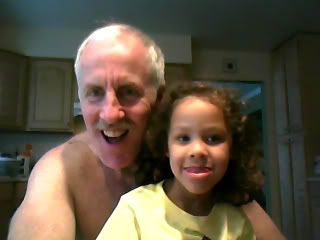Lil Bit is nearly five, still in pre-school and for the most part, unaware that her family is any different from anyone else's in anyway. To her, Mom is just "mommy" and Dad is just "Daddy." To the extent race plays any significant role in her consciousness, it's on the level that experts say most young children appreciate it: strictly in terms of colors. "Mommy is brown," she might say. "Daddy is white. Sister is brown and I'm…"
Well.
Sometimes she says "white like Daddy." And sometimes, particularly after a long session in the sun, "brown like Mommy." Once she said, "I want to be as brown as sister." Another time she said, "I'm almost white like Daddy." And yet another: "I look almost as brown as Mommy."
The beginnings of her process of self identification—and the questions that will accompany it—are evident in what she says. So are some my own conflicts about it. I confess that it bugs me a bit when she says she's white. I don't know how Kevin feels about this, but I wouldn't be at all surprised if it bothered him if she chose to identify as solely black. After all, she's a part of both us. Neither of us wants to be "erased."
A few months back, I was interviewed by Dr. Laura Berman on Oprah Radio regarding my book and other topics around interracial dating and relationships. A woman called in and shared that she (a black woman) and her husband (a white man) had recently had an argument because she'd said to their ambitious, mixed race, ten-year-old daughter "You can be the first black female President of the United States!"
"She's not black," her husband argued. "She's biracial. Why would you say that?"
The woman confessed to being genuinely surprised by how upset he was. "Our daughter looks like a black American—light skinned, but definitely not white. She's seen as black in our community and has even had some run-ins with white kids at school because of her color. I didn't think he'd react that way."
I didn't really have any advice for the woman—except that I think I understand how the husband felt. Unless you saw her with me, my Lil Bit would pass in the world as a white girl and saying that makes me, as a black woman uncomfortable in the same way that having his daughter perceived as solely black made that woman's white husband uncomfortable. I know a lot of black people don't like it, but Tiger Woods' identification as "Cablinasian" really was apt and sensitive in many ways. It recognized the different influences of ethnicity and culture that multi-racial children try to honor. For bi-racial and multi-racial children, single race identification quite literally erases people they love.
The real experts—the social psychologists and psychologists who work with mixed race children—say that racial identity is a constantly shifting thing for kids. In response to the question "What are you?" children can shift between being "black only" and "white only" to "both" then on to being simply "human." To be helpful a parent must put aside his or her own desires about how the child sees herself and provide as much support and information as possible. It's also helpful to realize that how the child sees herself and how the world sees her may not necessarily be the same. Knowing that there may be conflicts ahead, and training her to respond to them in ways that are self-affirming is just part of the uniqueness of being a mixed race person—and a part of the unique challenge of raising a mixed race child.
I'm all for supporting my daughter but the experts' advice leaves out the fact that parents have feelings too. It is my genuine hope to teach Lil Bit to value and claim all of her heritage proudly, erasing none of it. I know there might be heavy pressure from peers and others to fit her neatly into a single box—but I hope Kevin and I can support her in becoming the kind of young woman who can withstand it.
But I know that in the end, who she becomes is not my decision. It's hers.



Interesting post. Question from one mother to another--what are you plans in trying to expose both heritages and racial backgrounds? As a mom of three bi-racial children, I'm finding it a little difficult to explain.
ReplyDeleteGreat thoughtful post. When you think of all the things/obstacle your daughter may face as she matures, it hardly seems important to get a race category right. Love and happiness are open to all, and cancer and car accidents don't ask about race.
ReplyDeletemy sons used to joke about a new category for the census... they were fond of using the words 'whack' or 'blight'!
ReplyDeleteI'm curious, how will you train your daughter to respond to a world that may see her differently than she sees herself?
ReplyDelete